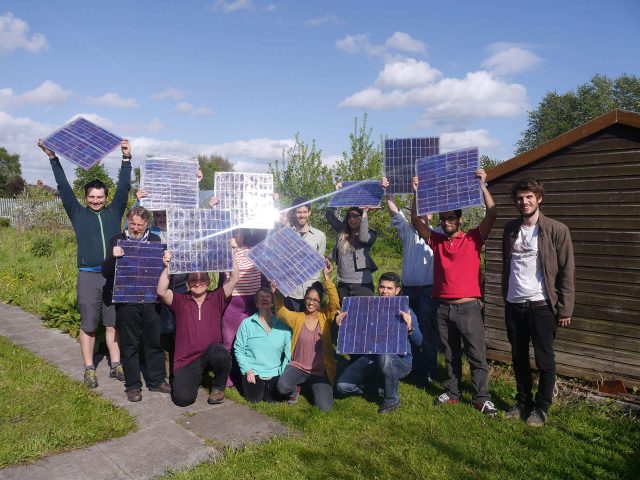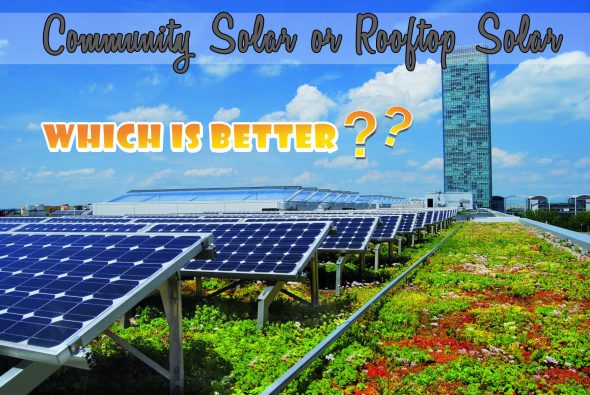This article was updated on June 08, 2023
The advancing technology has made solar energy for the homes more reliable and affordable. Many homeowners across the country are converting to renewable energy sources.
In the beginning, the solar panel system was a significant investment. In addition, they have to integrate panels, power storage units, and generators into their homes. It affects the overall aesthetics of their homes until rooftop solar panels and solar roof entered the picture.
Now community solar has changed the way people are embracing renewable energy. Their community model has made solar power more accessible to a broader consumer base.

Two Ways to Access Solar Energy
There are two existing methods to access solar energy for homeowners today:
Rooftop Solar And Community Solar
The rooftop solar is when the homeowners install panels in their individual homes. They can acquire the solar panel system either by buying their own or through a lease. It is a PV power station with solar panels mounted on the rooftop of houses, buildings and other structure for power generation. It is a complete system that includes the mounting system, photovoltaic modules, inverters, links, and other electrical components.
Community solar, on the other hand, allows the residents in an area or city to access a single solar power supply in their locality. Most community solar system is installed in a land where they can have adequate exposure and can capture more energy from the sun. An example of this is a vast commercial land that is open and without limitations of space. This eliminates the limiting factor, which most rooftop solar panels have.
In the solar community, a homeowner can enjoy the benefits of renewable energy source without having a substantial initial investment. Since collection panels and hardware are centrally located, there is no need for them to install the unsightly equipment on their homes. Because the cost of the solar panel system is shared, solar communities allow far greater accessibility to a renewable energy source to low-to-middle income families.
Related: Best Solar Flagpole Light of 2023 (The Top 5 For you)
What Differentiates Community Solar from Rooftop Solar
Program Model
In the rooftop solar, the homeowner owns the solar panels and make their investment. Others can acquire it through a lease. In community solar, the members share the expenses or obtain financing to start their project. The system works like a cooperative where the members can buy the electricity at a lower cost.
Billing
The owner in rooftop solar handles the bill while in a community solar a system administrator or an appointed member of the community manage the billing. One advantage of community solar is the credits on Virtual Net metering that they get on their monthly electricity bill. For rooftop solar owners, they are paid mostly through the credit on their energy bills.
Maintenance and Upkeep
Upon the completion of the community solar system, the maintenance is taken over by the project manager or engineer. The rooftop solar system, on the other hand, needs constant upkeep, maintenance, and most often, the company that sells the system does these. Some homeowners enter into a yearly maintenance contract while others opt for an on-call basis.
System Lifespan
Both rooftop and community solar panel system have the life expectancy of 25 to 30 years given proper upkeep and maintenance.
Property Values
Since the community solar has an agreement with a utility company, when they increase in quantity or value of the system, the value will not be accrued to the members. In rooftop solar, the system can enhance the value of the property.
Community solar are usually built near the communities that they serve, but it is far enough to make use of unimportant lands like near a landfill for maximum environmental impact.
Pros and Cons
Owning Solar Panels – Rooftop Solar
Pros:
- You own the system
- Once the solar panel system is installed, there will be no additional cost
- When you have excess power, you will earn them back from the grid
Cons:
- You need the right space to be able to install them, considering that it has maximum exposure to the sun and the panels are enough to run your household
- The panels have an impact on the overall aesthetics of your house
- You will bear all the cost of maintenance and upkeep
Community Solar
Pros:
- You do not have to worry about maintenance fees and installation costs
- Perfect for renters as you have the option to buy a short-term contract
- You save money as you pay less for the cost of solar energy and the yearly cost has little increment
Cons:
- You are dependent on your third-party supplier
- You will not get the 30% federal incentive
- You have to pay for the contract start fees and the termination fees
Which is Better Community Solar or Rooftop Solar?

Although many studies prove that community solar system can produce electricity that is cheaper than the individual rooftop solar. This study did not consider the costs that are placed on the consumer or the member when they are signing to the community solar. Some community solar collect contract fees and even termination fees. It takes some calculations to know which is not going to take much money from you and help you save some money.
The general rule is if you will rent for less than ten years, you can go with community solar and if you own a house, it is better to go rooftop solar.
www.oursolarenergy.com
In rooftop solar, you can have significant time savings because any excess that you produce will go back to you by the state grid and even get cash back. On top of that, there is 30% of a tax break and other tax incentives given by the state.
Large-scale community solar can optimize the transmission of energy to the grid and are more cost-effective than rooftop solar through time. Savings will be generated over the long term.
If you prefer to have energy independence and do not want to take up additional land for your clean energy, the rooftop solar option is a good fit for you. However, if you wish to lower cost, minimalist home aesthetics, and less maintenance, you should invest in remote community solar.
